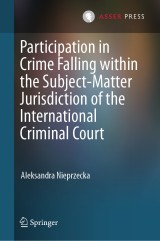Details
Participation in Crime Falling within the Subject-Matter Jurisdiction of the International Criminal Court
|
171,19 € |
|
| Verlag: | T.M.C. Asser Press |
| Format: | |
| Veröffentl.: | 18.06.2024 |
| ISBN/EAN: | 9789462656239 |
| Sprache: | englisch |
Dieses eBook enthält ein Wasserzeichen.
Beschreibungen
<p>This book centres on the forms of participation in crime set out in the Rome Statute, but it is definitely not a simple repetition or summary of the views expressed in the ICC case law. Instead, the work critically elaborates on the ICC practice and presents a theoretical and dogmatic description of modes of criminal responsibility that might be found in the Statute. </p><p>The element of novelty is however brought about by the methodology, which encompasses a normative analysis based on the distinction between the categories of sanctioned and sanctioning norms initially introduced by K. Binding in the German doctrine, but for the purposes of this book adjusted to the structure of international core crimes and reconciling them with the grounds for criminal responsibility as such. Moreover, the work does not avoid bold assertions concerning the norms of participation in crime concerning <em>inter alia </em>the concept of spectator or public approval and/or direct incitement to genocide.</p><p>This approach should be of particular interest to those who are under the impression that international criminal law is entangled in a multiplicity of labels and the judicial practice sometimes adopts the same requirements without any further thought or analysis. The book aims to trigger a broader debate on the merits and rationale of participation in crime and encourages readers to rethink some of the concepts developed within judicial practice. The work also takes into consideration the ICC case law, in particular some tendencies that might be inferred from the separate and concurring opinions in the <em>Ntaganda </em>case.<br></p><p>All in all, it endeavours to reflect on the content of Article 25 (3) and 28 of the Rome Statute and provide an answer on how ICC practice might and perhaps should evolve further.</p><p><strong>Aleksandra Nieprzecka, Ph.D.</strong> is a member of the Polish Bar Association in Kraków and worked as a principal researcher in the project concerningthe model of participation in crime adopted in the Rome Statute carried out at the Jagiellonian University in Kraków where she finished her doctoral studies according to the co-tutelle agreement between the Jagiellonian University in Kraków and the University of Hamburg.</p>
<p>Chapter 1. Introduction.- Chapter 2. Theory of Legal Norms.- Chapter 3. Interconnected Norms and the Crimes and Offences within the ICC Jurisdiction.- Chapter 4. Theoretical Models of Individual attribution.- Chapter 5. Perpetration.- Chapter 6. Prompting the Crime, Assisting in Crime, and Other Forms of Contribution to Its Commission.- Chapter 7. Superior Responsibility and Other Components of the Model of Individual Attribution.- Chapter 8. Summary and Final Conclusions.- Table Of Cases.- Index.</p>
This book centres on the forms of participation in crime set out in the Rome Statute, but it is definitely not a simple repetition or summary of the views expressed in the ICC case law. Instead, the work critically elaborates on the ICC practice and presents a theoretical and dogmatic description of modes of criminal responsibility that might be found in the Statute.<p>The element of novelty is however brought about by the methodology, which encompasses a normative analysis based on the distinction between the categories of sanctioned and sanctioning norms initially introduced by K. Binding in the German doctrine, but for the purposes of this book adjusted to the structure of international core crimes and reconciling them with the grounds for criminal responsibility as such. Moreover, the work does not avoid bold assertions concerning the norms of participation in crime concerning <em>inter alia </em>the concept of spectator or public approval and/or direct incitement to genocide.</p><p>This approach should be of particular interest to those who are under the impression that international criminal law is entangled in a multiplicity of labels and the judicial practice sometimes adopts the same requirements without any further thought or analysis. The book aims to trigger a broader debate on the merits and rationale of participation in crime and encourages readers to rethink some of the concepts developed within judicial practice. The work also takes into consideration the ICC case law, in particular some tendencies that might be inferred from the separate and concurring opinions in the <em>Ntaganda </em>case.<br></p><p>All in all, it endeavours to reflect on the content of Article 25 (3) and 28 of the Rome Statute and provide an answer on how ICC practice might and perhaps should evolve further.</p><p><strong>Aleksandra Nieprzecka</strong> is a member of the Polish Bar Association in Kraków and worked as a principal researcher in the project concerning the model of participation in crime adopted in the Rome Statute carried out at the Jagiellonian University in Kraków where she finished her doctoral studies according to the co-tutelle agreement between the Jagiellonian University in Kraków and the University of Hamburg.</p>
Will the ICC revisit the ‘control over the crime’ theory? The book presents the alternatives for this concept Substantive or significant contribution to the crime: the book indicates the threshold required by the Rome Statute Direct and public incitement to genocide: the book explains why the concept shall be extended to other core crimes


















